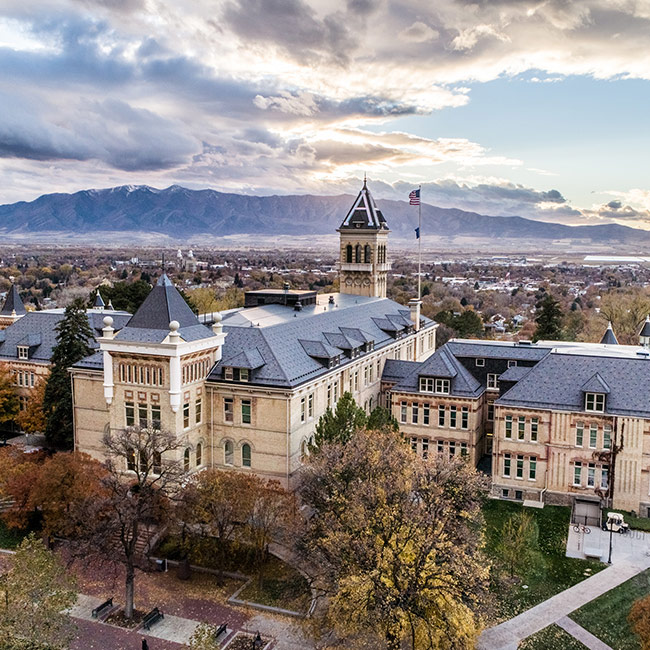About This Degree
Utah State University is the only public university in the state that offers advanced degrees in range science, and it is the only university in the state with a college of natural resources.
As a land-grant institution, USU is committed to educating students and preparing them for work in conservation and preservation of range lands.
What You Will Learn
Students in this program study the science and application of ecology principles in rangeland environments. While the focus of range sciences at USU is primarily on the rangelands of the Great Basin, students will receive a broad background in various subjects in rangeland ecosystems. Students can study specific areas related to rangeland science, such as vegetation management, animal behavior, and restoration of rangelands.
ADVISING
At a Glance
College: S.J. & Jessie E. Quinney College of Natural Resources
Department: Wildland Resources Department
USU Locations:
- Logan campus
Faculty: View profiles of faculty members on the department directory.
Program Requirements
Career And Outcomes
Career Opportunities
At the PhD level, graduates primarily pursue the following career paths:
- Researchers for government agencies
- University faculty and academia
- Environmental consultants
Students who graduate with master’s degrees have a wide variety of options, such as:
- Work for government agencies
- Conservationists
- Range management specialists
- Non-government organizations
Graduates can also apply their knowledge of range science to other areas, such as real estate and business.
Job Outlook
USU Locations

LOGAN CAMPUS
Admission
Admission Requirements
Students with undergraduate degrees in natural resources or sciences are preferred.
To be accepted to the program, it is recommended that applicants first contact a specific faculty member with whom they are interested in working. If the faculty member is accepting graduate students and agrees to work with the student, the student can then apply by completing the following application requirements:
Application Requirements:
- Complete the online application
- Pay the $55 application fee
- The GRE is not required by the Department or College, but that specific advisors may require GRE scores
- Have a 3.0 or higher GPA on your last 60 semester or 90 quarter credits
- Provide transcripts of all college/university credits
- Provide three contacts for letters of recommendation
International students have additional admissions requirements.
Deadlines
Applications for graduate programs are accepted year-round. However, chances for acceptance are best if students apply between October and January. It is also encouraged that students begin in the fall if possible.
Program Requirements
PhD Qualifying Exams:
PhD students must pass comprehensive examinations. This exam is used to assess whether a student is prepared to successfully conduct independent research. The assessment depends upon the student’s knowledge in his or her area of study and in supporting areas, understanding of philosophical perspectives on scholarship, and ability to communicate this knowledge effectively.
It is recommended that the comprehensive exam be taken by the end of the student’s second academic year, and it must be passed no later than one year prior to defending the dissertation and before candidacy will be recommended.
Plan Options
Students can receive the MS by pursuing one of two options:
- In the Plan A option, students complete graduate-level coursework and must write a thesis.
- The Plan B option requires the production of a paper or creative work of art and is expected to reflect equivalent scholarship standards as a thesis.
Financial Aid
The Department of Wildland Resources provides funding for most of its graduate students through research assistantships, available through professors having contracts, grants, or other awards.
A variety of funding opportunities are available on the graduate school website.
Take The Next Step
How to Apply
View our step-by-step guide on how to become an Aggie.
Request Information
Contact the School of Graduate Studies to ask questions or receive more information.
Cost and Funding
Calculate the cost of graduate school and learn about funding opportunities.
You May Also Be Interested In

Ecology
Work on exciting research projects with renowned faculty studying ecology through the lens of a variety of different scientific disciplines.

Master of Natural Resources
Earn a master’s as a working professional as you take courses to help you become a manager and decision maker in the natural resources field.

Natural Resources and Environmental Communication and Engagement (NRECE)
Earn a certificate in natural resources and environmental education that will allow you to effectively teach natural resources and environmental education to individuals in various settings.

Wildlife Biology
Study the management of human-wildlife conflict and current issues and concerns in natural resources under professors who are world-renown for their research and publications.

